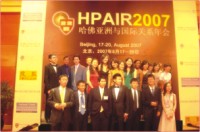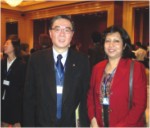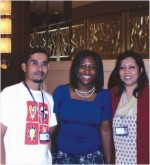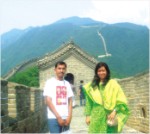Feature
HPAIR Academic Conference 2007
Muhammad Asadullah (Asad)
 The Harvard Project for Asian and International Relations (HPAIR) is a partnership organization of Harvard University Faculty of Arts and Sciences. It arranges International Academic Conference each year to facilitate discussion on the most important economic, political, social and cultural issues relevant to the Asia-Pacific region. HPAIR's International Academic Conference has emerged as the largest annual Harvard University event in Asia. The Harvard Project for Asian and International Relations (HPAIR) is a partnership organization of Harvard University Faculty of Arts and Sciences. It arranges International Academic Conference each year to facilitate discussion on the most important economic, political, social and cultural issues relevant to the Asia-Pacific region. HPAIR's International Academic Conference has emerged as the largest annual Harvard University event in Asia.
The HPAIR 2007 Academic Conference marked HPAIR's 16th year. This year the conference took place at the Grand Hyatt Beijing and other venues throughout Beijing from August 17 to 20, 2007. HPAIR 2007 had a long tradition of excellence. It brought together approximately 400 undergraduate and graduate students for a meaningful dialogue and interaction with business, academic, and political leaders to discuss issues relating to social, economic, political, cultural and religious issues that concern the Asia-Pacific area.
The theme of HPAIR 2007 Academic Conference was Engaging Asia: Discourse and Dialogue. The conference aimed at identifying key areas of change in Asia today and discussed their implications for future.
His Excellency Ong Keng-Yong, Secretary-General of the Association of Southeast Asian Nations (ASEAN) was the keynote speaker in the opening ceremony of this Academic Conference.
Student delegates representing more than 200 universities of 30 countries participated in the conference. Delegates from Harvard, Yale, Princeton, Oxford, Cambridge, LSE, UN University and Dhaka University played a key role at the 16th HPAIR Academic Conference 2007.
Sultana Afroz, Deputy Secretary, Ministry of Establishment of the Government of Bangladesh, who was also a Harvard graduate from the Kennedy School of Government, attended the conference as a panel speaker in two sessions. In her speech, Sultana Afroz emphasized the influence of culture and religion in leadership in Asia. She maintained, how deep was the influence of culture in the making of leadership in Asian countries. In these countries, people cared most for charismatic leadership and this led to hero-worshipping. Hers was a critical but new and unconventional approach and it caught attention of all who attended the conference.
I am Muhammad Asadullah(Asad), a student of English Department from Dhaka University also participated in this prestigious Academic Conference as a delegate.
Both Sultana Afroz and I while discussing relevant matter with ASEAN Secretary General emphasized that SAARC and ASEAN should merge on common interest for rapid development in Asia. Sultana Afroz played a very vital role in leadership workshop as one of the distinguished speakers in this Academic Conference. I also shared my experience of leadership and economic growth of Bangladesh with other delegates in the workshop.
 We were selected from very highly selective pool of more than 4000 international applicants around the world. We were also very active in the field trip, HPAIR Club Program and other meetings besides the workshop in Academic Conference. We raised many issues regarding SAARC with other Indian and Pakistani delegates. We with our Indian & Pakistani delegates discussed a lot about the role & contribution of students in SAARC. We were selected from very highly selective pool of more than 4000 international applicants around the world. We were also very active in the field trip, HPAIR Club Program and other meetings besides the workshop in Academic Conference. We raised many issues regarding SAARC with other Indian and Pakistani delegates. We with our Indian & Pakistani delegates discussed a lot about the role & contribution of students in SAARC.
The HPAIR Academic Conference was a four-day academic program with six workshops concurrently conducted throughout the conference. This year, workshop topics were Economics, Leadership, Popular Culture, Popular History, Security, Social Policy, and Technology. In addition to the workshops, there were plenary panel sessions on Energy and The Olympic Games
The Host Country Organizing Committee (HCOC) Beijing, had a number of students from Peking University, Tsinghua University and Renmin University and they made the Academic Conference fruitful and enjoyable along with Andrew Q.Jing and Cherry C.Miao, the Co-Chairs of HPAIR and Co-Directors of the Academic Conference. Ong Keng-Yong, Secretary-General of the Association of Southeast Asian Nations (ASEAN) in his keynote speech, emphasized on the legacy of Asian Civilization and Culture. He also talked on the learning, culture, industry, adaptability, family value & civilizatioal legacy of Asia as the ingredients of Asian Civilization.
Cherry C.Miao, the Co-Chair of HPAIR said in the opening ceremony that this conference would provide a basis not only for discussion while we are gathered here together, but also for relationships that would endure long after the conference ends.
 Ann Kideder, fond of art & music from USA wants to make a bridge between Asian art & Western Art. This conference gave her a wonderful opportunity to have first hand experience of Asian art & culture from the delegates around the world in which she feels very interested. Ann Kideder, fond of art & music from USA wants to make a bridge between Asian art & Western Art. This conference gave her a wonderful opportunity to have first hand experience of Asian art & culture from the delegates around the world in which she feels very interested.
Einat Erlanger from Hebrew University, Israel urges that this academic workshop is a unique chance to learn & share what is a happening around the world.
Eduardo Gomez from Costa Rica shared educational & economic policy of his country with other Asian countries through this Academic Conference.
Shannon M Ashford from John F.Kennedy School of Government, Harvard University emphasized on the pattern of leadership in Asia & West. She also said that this conference would bring future leaders of the world very close to enhance ideas & share knowledge.
 Field Trip: Field Trip:
On the19th of August, we started our filed trip at 8:30 am. We went to see the Great Wall, Tiananmen Square, Silk Market, Forbidden City and National Museum. We were very excited & amazed to see the miraculous Great Wall. Everywhere in this field trip we faced horrible problems with language. Without Muzib Bhai, a Bangladeshi student in Beijing Language & Cultural University, it would have been quite impossible to know everything as we did not know Chinese Language. Muzib Bhai helped us every where as he was very efficient in Chinese Language.
We also went to Peking University & Tsinghua University at night to meet some Bangladeshi students who had been studying here with 100% scholarship. We were simply astonished to see the extra ordinary relation of Bangladesh with China. There are many Bangladeshi students who are coming to the best universities in China with full scholarship from Education Ministry of Bangladesh Government. The most amazing part of this relation is that the people who have Diplomat passport & Gratis passport they do not need any visa to enter China now!
 One of the most salient features of Beijing now is the reconstruction for Beijing Olympic 2008. The whole China is in a state of euphoria for Beijing Olympic 2008. Every where in Beijing we saw T-shirt, Bill board, Poster, Exhibition, Discussion & most importantly construction for Olympic 2008,the Greatest Show on Earth. The crazy features of Beijing for Olympic made us also very excited & mad to come to Beijing once again for Olympic 2008. One of the most salient features of Beijing now is the reconstruction for Beijing Olympic 2008. The whole China is in a state of euphoria for Beijing Olympic 2008. Every where in Beijing we saw T-shirt, Bill board, Poster, Exhibition, Discussion & most importantly construction for Olympic 2008,the Greatest Show on Earth. The crazy features of Beijing for Olympic made us also very excited & mad to come to Beijing once again for Olympic 2008.
On 20 August, this four-day academic program ended with a dream to see a potential united, prosperous & wonderful Asia where people can live with dignity, self-respect, education & basic needs of human rights. With the announcement of the next HPAIR in Vietnam, Andrew & Cherry drew the concluding remark of this thought-provoking Academic Conference HPAIR 2007.
| 